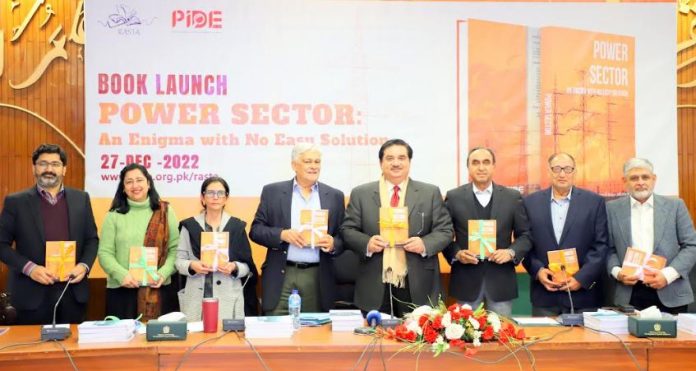It provides deep insights into various segments of the power sector and suggests workable, sustainable, and integrated solutions to the power sector woes.
Policy has been adopted to generate electricity from cheaper sources and thousands of megawatts will be generated from solar power: Khurram Dastgir Khan
ISLAMABAD, DEC 27 /DNA/ – Pakistan’s energy sector is going through a severe crisis. The circular debt of the power sector has escalated to Rs 2.44 trillion. To research and find solutions to the long-standing energy sector problems, the Pakistan Institute of Development Economics (PIDE) formed a ‘PIDE Power Commission’. The Commission comprises power sector experts with decades-long experience in the sector. With their valuable contribution, PIDE has compiled a book titled ‘Power Sector: An Enigma with No Easy Solution’, funded by the RASTA programme. The book provides deep insights into various segments of the power sector and suggests workable, sustainable, and integrated solutions to the power sector woes.
The PIDE book “Power Sector: An Enigma with No Easy Solution” was launched today at the Planning Commission. The book is a combined effort of PIDE Power Commission members and staff at the PIDE. PIDE Power Commission comprises the most knowledgeable energy team ever assembled in the energy sector.
At the event, introductory remarks were given by the Vice Chancellor of PIDE, Dr. Nadeem ul Haque. He said Pakistan had suffered a lot because of the energy crisis for many years. Circular debt has been with us for 15 years or so. Pakistan has incurred massive losses (a cumulated loss of more than Rs 5 trillion). It’s time to take the matter seriously. This book is an effort from our side.
The Federal Minister for Energy (Power Division), Engineer Khurram Dastgir Khan graced the occasion with his presence. In his remarks as a chief guest, he said, a policy has been adopted to generate electricity from cheaper sources and thousands of megawatts will be generated from solar power in different areas of the country.
“During the recent floods in the country, we did not let electricity become a problem and ensured power supply in all affected areas” he mentioned.
He said that in the future, all power-generating plants in the country would be planned on local fuel. The foreign exchange would be saved by reducing the consumption of imported oil, furnace oil, and coal.
Federal Minister said that it is a fact that the country has plenty of expensive electricity, but the government does not have plenty of cheap electricity. The challenges for us are many. All issues mentioned in this book are correct. We have to address these issues.
He said that the Billing issues would be addressed as a top priority to reduce losses in the power sector. In addition, adequate measures are being taken to prevent and catch electricity theft. This will reduce the burden on common consumers.
“At the governance level, significant steps are being taken to collect electricity bills. Because bills are not being paid on a large scale, but only electricity is demanded. In the next two weeks, the vacant vacancies will also be filled”, he added
He further added that the government is working fast on eco-friendly and affordable power generation projects that will yield far-reaching results. He said that the Shanghai Electric Power Project of 1320MW would start production next month that would run on Thar coal and provide cheaper electricity.
The federal minister said that to check expensive rates, the government is trying to find cheaper resources that can generate electricity from Rs7 to Rs8 per unit to reduce the burden on the common man. To speed up the development journey, local coal, water, wind, and solar power generation projects are being promoted.
Earlier, a leading member of the PIDE Power Commission, Engr. Tahir Basharat Cheema presented the overview of the book.
The PIDE book has gone into power sector history and every power supply chain segment to find the current crisis’s root. It covers generation problems, transmission constraints, and noncompliance with industry codes leading to unreliable power supplies, distribution side challenges, and weaknesses in the regulatory structure. It has discussed in detail the inefficiencies in the existing tariff design. Furthermore, it argued that a lack of adequate planning and a comprehensive policy over the years had taken us to the stage where we are today. Various departments in the energy sector are less oriented toward delivery; they lack resources and have outdated techniques and procedures.
Apart from providing deep insights into various segments of the power sector, this book has suggested workable, sustainable, and integrated solutions to all the power sector’s perennial difficulties. For instance, the book talked about decentralizing power for better management and making companies accountable for their decisions. Further, it suggested strengthening human resources at all levels through independent professional management and human resource development. It advocated for the mandatory listing of the DISCOs on the stock exchange with a limit of 5% maximum by one shareholder.
The book suggested the forensic audit of both public and private generation companies immediately, followed by recoveries without any relaxation for any IPPs, and asks for a complete halt on sovereign guarantees to investors in the future. It asks for a complete revamp of tariff design and to start the market with bilateral contracts keeping transmission constraints and participants’ capacities in mind. It urges the adoption of technology, such as pre-paid smart meters, to solve many of the power sector problems. Among many other suggestions, the book recommended forming a Power Commission comprising committed power sector professionals to guide and monitor the reform process in the sector.
The members of the PIDE Power Commission including Engr. Salis Usman, General Manager Power Planning, NTDC; Engr. Mujahid Islam Billah, Ex. CEO, FESCO; Mr Basharat Ali, CFO, PEPCO; Engr. Sajad Haider Syed, Dy. Manager, NTDC; Engr. Masood Akhtar, Former GM, NPCC; Engr. Azhar Iqbal, Director Finance, PEPCO; Engr. Adnan Riaz Mir, GM, Monitoring, PP&MC; and Engr. Abdul Qadeer Khan, Ex GM, NPCC, were also present the event.

















